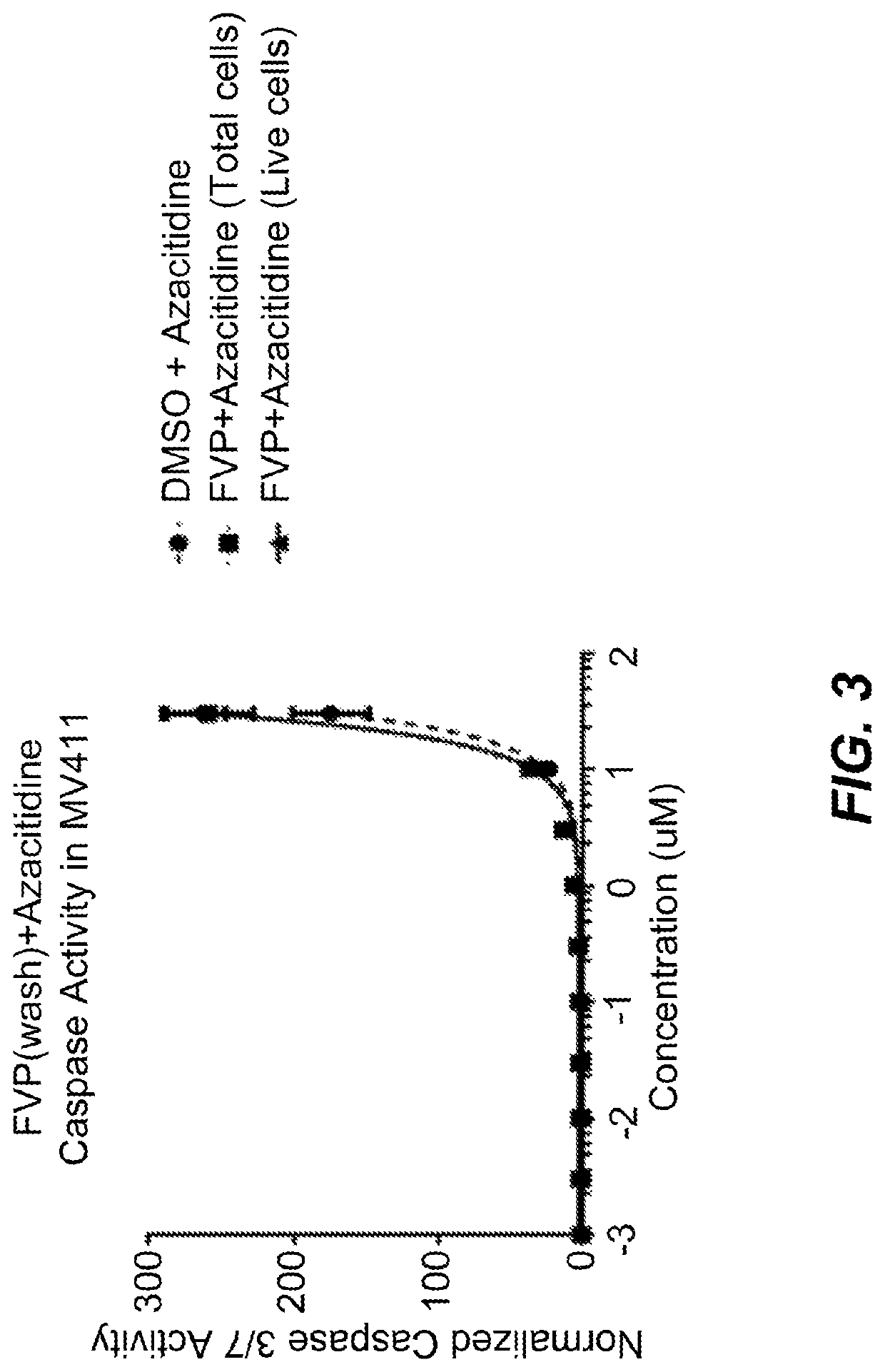Combination therapies for treatment of cancer
a cancer and therapy technology, applied in the field of cancer treatment methods, can solve problems such as relative poor survival rates
- Summary
- Abstract
- Description
- Claims
- Application Information
AI Technical Summary
Benefits of technology
Problems solved by technology
Method used
Image
Examples
example 1
Alvocidib Lowers MCL-1 Expression in a Time and Dose Dependent Manner
An AML cell line, MV-4-11, expresses MCL-1. MCL-1 is a key anti-apoptotic protein in MV-4-11 cells. Alvocidib, a CDK9 inhibitor, lowers the expression of MCL-1, which is already well documented in the literature. Alvocidib down-regulates MCL-1 in a dose dependent manner (FIG. 1A). The dose dependence is observed by monitoring the relative expression of MCL-1 compared to β-actin when cells are dosed with alvocidib at concentrations of 0-8 μM. MV4-11 cells were treated with Alvocidib for 16 hrs in vitro. Following treatment, cells were harvested and prepared using standard western blotting technique for immuno-detection of MCL-1 and β-actin expression. Dosage of 0.1 μM Alvocidib reduced MCL-1 expression, whereas 1 μM Alvocidib completely blocked expression at 16 hrs.
In addition, alvocidib also down-regulates MCL-1 in a time-dependent manner (FIG. 1B). The time dependence is observed by monitoring the relative express...
example 2
Combination Treatment with Alvocidib and Azacitidine and its Effect on Cell Viability
AML cell proliferation is inhibited synergistically by dosing with alvocidib and azacitidine. Alvocidib was used alone and in combination with azacitidine in order to determine the effect of the single drug and combination on cell viability. A significant shift in cell viability was observed when cells were dosed with the combination of alvocidib and azacitidine compared with cells dosed only with azacitidine.
MV 4-11 cells were dosed first with alvocidib (80 nM) or DMSO for 24 hours followed by a wash step. Following the wash step, the cells were dosed with azacitidine (30 μM to 0.001 μM) for an additional 72 hours. Measurement of cell viability was taken at 96 hours from the initial dose (72 hours after the wash step) and normalized to data collected for cells dosed with alvocidib only. Cell viability was then assessed in a Cell titer-glo assay, according to manufacturer protocol. Cell viability wa...
example 3
Combination Treatment Effect on Caspase 3 / 7 Activity and Apoptosis
Alvocidib was used combination with azacitidine to treat MV 4-11 cells. The combination treatment was compared with treatment using azacitidine only. The comparison was used to assess the synergistic effect of the combination on caspase 3 / 7 activity and apoptosis. The addition of 80 nM Alvocidib to 5-Azacytidine treatment results in synergistic increases in caspase activity in MV4-11 cells.
The cells were dosed initially with alvocidib for 24 hours followed by a wash step. Next, cells were dosed with azacitidine for 24 hours. Caspase 3 / 7 activity was measured 48 hours after the initial dose of alvocidib (24 hours after wash step and dose of azacitidine). The normalized caspase 3 / 7 activity of cells treated with the combination of alvocidib (FVP) and azacitidine was plotted against the concentration range of azacitidine (see FIG. 3). The dose of alvocidib remained constant (80 nM) across the dosing range for azacitidine...
PUM
 Login to View More
Login to View More Abstract
Description
Claims
Application Information
 Login to View More
Login to View More - R&D
- Intellectual Property
- Life Sciences
- Materials
- Tech Scout
- Unparalleled Data Quality
- Higher Quality Content
- 60% Fewer Hallucinations
Browse by: Latest US Patents, China's latest patents, Technical Efficacy Thesaurus, Application Domain, Technology Topic, Popular Technical Reports.
© 2025 PatSnap. All rights reserved.Legal|Privacy policy|Modern Slavery Act Transparency Statement|Sitemap|About US| Contact US: help@patsnap.com



